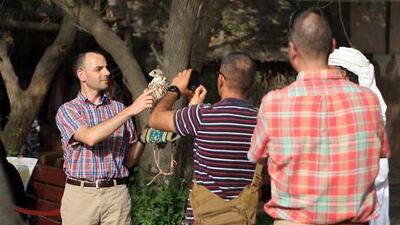Indian and Russian guests are the new toast of the capital.
While domestic tourists still form the biggest pool of clients for the emirate, India is the largest overseas market for Abu Dhabi.
India toppled the United Kingdom, which was the largest market in first half of 2012. More than 80,000 Indian guests stayed in Abu Dhabi's hotels in the first half of the year, a 22 per cent rise on the same period last year.
They stayed an average of 4.17 nights. More than 78,000 Britons stayed in the emirate's hotels from January to June, followed by Germany with 62,000 guests.
In the first half of the year, Russians stayed the longest in the emirate's hotels, checking in for about six nights, a 6 per cent increase over the same period last year.
The number of visitors from Russia was, however, smaller than those from Germany and the United Kingdom with a little more than 13,000.
"We are benefiting from increased destination awareness in India following the opening a year ago of a dedicated promotions office there and also of increased air access from the country following Etihad Airways' equity stake in Jet Airways and the move by the Indian carrier of its Middle East hub to Abu Dhabi," said Mubarak Al Muhairi, the director general of Tourism and Culture Authority (TCA) Abu Dhabi, which yesterday released data for the first half of the year.
Air traffic from Abu Dhabi airport to India grew by 18 per cent between January and June this year over the same period last year, Abu Dhabi Airports Company (Adac) said yesterday. It was followed by traffic to Saudi Arabia, Germany, Thailand and the UK.
For the Thai hotel group Anantara Hotels, Resorts and Spas, which has four properties in Abu Dhabi, the Russian and Indian markets remain potential growth areas.
"We are aiming for a pickup in growth towards the end of summer, which should be in response to all our public relations and sales efforts," said Nancy Nusrally, the area public relations manager of the hotel group in Abu Dhabi.
"With the recent launch on Sir Bani Yas Island, we are aiming for greater response from the Russian market who are known to target beach resorts."
The top source markets for the chain in Abu Dhabi remain the domestic market, Germany, the UK, France, Australia and Holland.
Overall, the emirate recorded an increase of 12 per cent in the number of guests staying in its 145 hotels and hotel apartments for the first half of this year compared to the same period last year.
Abu Dhabi also announced plans to meet growing demand from cruise ship passengers.
There are 15 hotels under construction and 11 more in the pipeline, according to STR Global consultancy.
About 1.3 million guests checked into Abu Dhabi during this period. At an average guest stay of 3.17 nights, hotels in Abu Dhabi had an occupancy rate of 71 per cent, 8 per cent more than last year.
Hotel revenues also rose along with the occupancy. Operators in Abu Dhabi raked in Dh2.7 billion, with income from food and beverage sales registering Dh1bn.
There was, however, a 3 per cent decrease in average room rates to Dh447.
"Despite the steady growth in tourism arrivals, hotel room rates in Abu Dhabi have seen a freefall since 2009 and 2010," said Rashid Aboobacker, a senior consultant at TRI Hospitality Consulting. "The rate fall was triggered due to the substantial growth in supply during this period and the domino effect of the price competition among hotels across all segments and classes. This is exacerbated by the entry of new hotels who tend to undercut rates to capture market share in a fiercely competitive market."
In keeping with the rise in hotel guests, air passenger traffic at Abu Dhabi airport also rose in the first half of this year.
About 7.9 million passengers went through the airport during the first six months, an increase of 12.6 per cent over same period last year, according to Adac. Cargo traffic also increased with 325,737 tonnes of cargo passing through Abu Dhabi, a 21.5 per cent rise.
Separately, Abu Dhabi Ports Company (ADPC) said yesterday it plans to upgrade facilities at Port Zayed to accommodate the growing number of cruise ship passengers visiting Abu Dhabi.
The project includes a new terminal building and a traditionally themed souq and heritage area.
ADPC said it has "allocated the south-eastern end of the port berth, the end closest to Sheikh Khalifa Bridge, as an area to be developed specifically for cruise liners and passengers".
Phase 1 will be completed for the start of the next cruise ship season in October.
A total of 96 vessels and 155,000 passengers visited Zayed Port last season, ADPC said.

